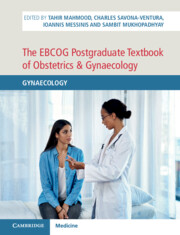Book contents
- The EBCOG Postgraduate Textbook of Obstetrics & Gynaecology
- The EBCOG Postgraduate Textbook of Obstetrics & Gynaecology
- Copyright page
- Dedication
- Contents
- Videos
- Contributors
- Preface
- Section 1 Basic Sciences in Gynaecology
- Section 2 Menstrual Disorders
- Section 3 Reproductive Endocrinology and Infertility
- Section 4 Contraception and STIs
- Section 5 Post-Reproductive Care
- Section 6 Vulva and Vagina
- Section 7 Cervix
- Section 8 Uterus
- Section 9 Ovary and Fallopian Tubes
- Section 10 Operative Gynaecology
- Section 11 Public Health Issues in Gynaecology
- Section 12 Miscellaneous
- Chapter 58 Prophylactic Bilateral Salpingo-oophorectomy
- Chapter 59 Immunotherapy for Gynaecological Cancers
- Chapter 60 Radiotherapy for Gynaecological Cancer
- Chapter 61 Clinical Audit and Risk Management in Gynaecology Practice
- Chapter 62 Research in Obstetrics and Gynaecology
- Chapter 63 Skills Training and Simulation
- Chapter 64 Practical Medical Education Science for Clinical Teaching Sites
- Chapter 65 Algorithm for Managing Vulvovaginal Symptoms
- Index
- Plate Section (PDF Only)
- References
Chapter 63 - Skills Training and Simulation
from Section 12 - Miscellaneous
Published online by Cambridge University Press: 24 November 2021
- The EBCOG Postgraduate Textbook of Obstetrics & Gynaecology
- The EBCOG Postgraduate Textbook of Obstetrics & Gynaecology
- Copyright page
- Dedication
- Contents
- Videos
- Contributors
- Preface
- Section 1 Basic Sciences in Gynaecology
- Section 2 Menstrual Disorders
- Section 3 Reproductive Endocrinology and Infertility
- Section 4 Contraception and STIs
- Section 5 Post-Reproductive Care
- Section 6 Vulva and Vagina
- Section 7 Cervix
- Section 8 Uterus
- Section 9 Ovary and Fallopian Tubes
- Section 10 Operative Gynaecology
- Section 11 Public Health Issues in Gynaecology
- Section 12 Miscellaneous
- Chapter 58 Prophylactic Bilateral Salpingo-oophorectomy
- Chapter 59 Immunotherapy for Gynaecological Cancers
- Chapter 60 Radiotherapy for Gynaecological Cancer
- Chapter 61 Clinical Audit and Risk Management in Gynaecology Practice
- Chapter 62 Research in Obstetrics and Gynaecology
- Chapter 63 Skills Training and Simulation
- Chapter 64 Practical Medical Education Science for Clinical Teaching Sites
- Chapter 65 Algorithm for Managing Vulvovaginal Symptoms
- Index
- Plate Section (PDF Only)
- References
Summary
Postgraduate training in obstetrics and gynaecology relies heavily on the acquisition of practical and procedural skills in a broad array. The European Board and College of Obstetrics and Gynaecology (EBCOG) have recently revised their postgraduate training curriculum according to competency-based training principles [1]. The EBCOG curriculum contains 10 core entrustable professional activities (EPAs) [2] and 8 elective EPAs, in which competency levels of technical and procedural skills as well as communication skills are defined.
- Type
- Chapter
- Information
- The EBCOG Postgraduate Textbook of Obstetrics & GynaecologyGynaecology, pp. 536 - 538Publisher: Cambridge University PressPrint publication year: 2021



